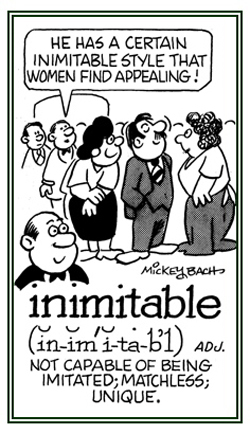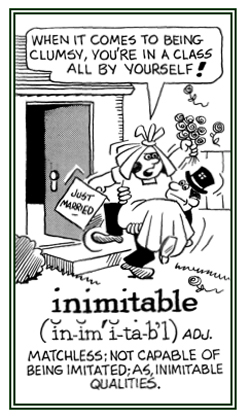imitat-
(Latin: copy, repeat, represent; repetition)
imitate (verb), imitates; imitated; imitating
1. To do, or to try to do, after the manner of someone else; to try to be the same as.
2. To mimic; counterfeit; such as, a tone of voice.
3. To make a copy, or reproduction of; to duplicate.
4. To use as a pattern or a model.
5. To assume the appearance of; to look like.
2. To mimic; counterfeit; such as, a tone of voice.
3. To make a copy, or reproduction of; to duplicate.
4. To use as a pattern or a model.
5. To assume the appearance of; to look like.
1. The act of something being done, or made in resemblance of something else; a likeness; also, a counterfeit; such as, an imitation of legal money.
2. In music, the repetition of a phrase, or subject, in another voice or a different key.
3. In biology, mimicry of an environment, or of another animal, plant, etc., for concealment or protection.
4. Etymology: from Old French imitacion; from Latin imitationem, imitatio, "imitation"; from imitari, "to copy, to portray, to imitate".
2. In music, the repetition of a phrase, or subject, in another voice or a different key.
3. In biology, mimicry of an environment, or of another animal, plant, etc., for concealment or protection.
4. Etymology: from Old French imitacion; from Latin imitationem, imitatio, "imitation"; from imitari, "to copy, to portray, to imitate".
Related to Latin imago, from "artificial representation that looks like a person or thing", from Old French image, earlier imagene (11th century), from Latin imaginem, imago, "copy, statue, picture, idea, appearance"; from the stem of imitari "to copy, to imitate".
imitational (adjective), more imitational, most imitational
Made to resemble something else; usually, a superior material; such as, fur.
imitative (adjective), more imitative, most imitative
1. Inclined to resemble something with another form of duplication.
2. Formed after a copy or model; like an original.
3. Fictitious; a counterfeit.
4. In linguistics, designating a word that approximates a natural sound, such as, "buzz", "clink", or "swish".
2. Formed after a copy or model; like an original.
3. Fictitious; a counterfeit.
4. In linguistics, designating a word that approximates a natural sound, such as, "buzz", "clink", or "swish".
imitatively (adverb), more imitatively, most imitatively
Characterized by copying and not being original, or modeled after something else.
1. A tendency to copy someone or something.
2. The reproduction of an original; especially, in an inferior manner.
2. The reproduction of an original; especially, in an inferior manner.
1. Someone who copies the words, or behavior, of another person; such as, an impersonator.
2. Anyone who fraudulently assumes the appearance of another person; a copycat or an emulator.
2. Anyone who fraudulently assumes the appearance of another person; a copycat or an emulator.
inimitable (i NIM i tuh buhl) (adjective), more inimitable, most inimitable
1. Descriptive of something that is impossible to copy or to reproduce by another person in the same way; one of a kind: Latonya was an inimitable storyteller for children.

© ALL rights are reserved.

© ALL rights are reserved.
Go to this Word A Day Revisited Index
Athena excited the audience with a speech that was delivered in her own inimitable style.
2. Etymology: from Latin inimitabilis, "that which cannot be imitated"; from in-, "not" + imitabilis, "copy, represent".

Go to this Word A Day Revisited Index
so you can see more of Mickey Bach's cartoons.
<img src="/img/left_arrow_sm.gif" alt="" /> <img src="/img/right_arrow_sm.gif" alt="" />
Showing 1 page of 8 main-word entries or main-word-entry groups.
